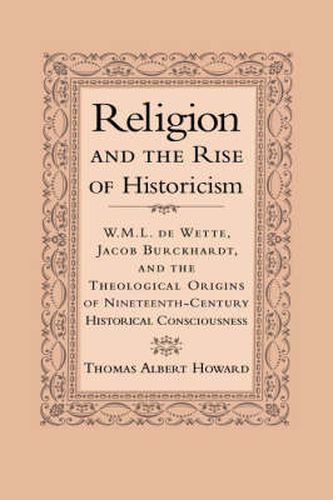Readings Newsletter
Become a Readings Member to make your shopping experience even easier.
Sign in or sign up for free!
You’re not far away from qualifying for FREE standard shipping within Australia
You’ve qualified for FREE standard shipping within Australia
The cart is loading…






This book offers an interpretation of the rise of secular historical thought in nineteenth-century Europe. Instead of characterizing ‘historicism’ and ‘secularization’ as fundamental breaks with Europe’s religious heritage, they are presented as complex cultural permutations with much continuity; for inherited theological patterns of interpreting experience determined to a large degree the conditions, possibilities, and limitations of the forms of historical imagination realizable by nineteenth-century secular intellectuals. This point is made by examining the thought of the German theologian W. M. L. de Wette and that of the Swiss-German historian Jacob Burckhardt. Burckhardt’s meeting with de Wette and his subsequent decision to study history over theology are interpreted as revealing moments in nineteenth-century intellectual history. By examining their encounter, its larger historical context, and the thought of both men, the book demonstrates the centrality of theological concerns and forms of knowledge in the emergence of modern, secular historical consciousness.
$9.00 standard shipping within Australia
FREE standard shipping within Australia for orders over $100.00
Express & International shipping calculated at checkout
This book offers an interpretation of the rise of secular historical thought in nineteenth-century Europe. Instead of characterizing ‘historicism’ and ‘secularization’ as fundamental breaks with Europe’s religious heritage, they are presented as complex cultural permutations with much continuity; for inherited theological patterns of interpreting experience determined to a large degree the conditions, possibilities, and limitations of the forms of historical imagination realizable by nineteenth-century secular intellectuals. This point is made by examining the thought of the German theologian W. M. L. de Wette and that of the Swiss-German historian Jacob Burckhardt. Burckhardt’s meeting with de Wette and his subsequent decision to study history over theology are interpreted as revealing moments in nineteenth-century intellectual history. By examining their encounter, its larger historical context, and the thought of both men, the book demonstrates the centrality of theological concerns and forms of knowledge in the emergence of modern, secular historical consciousness.